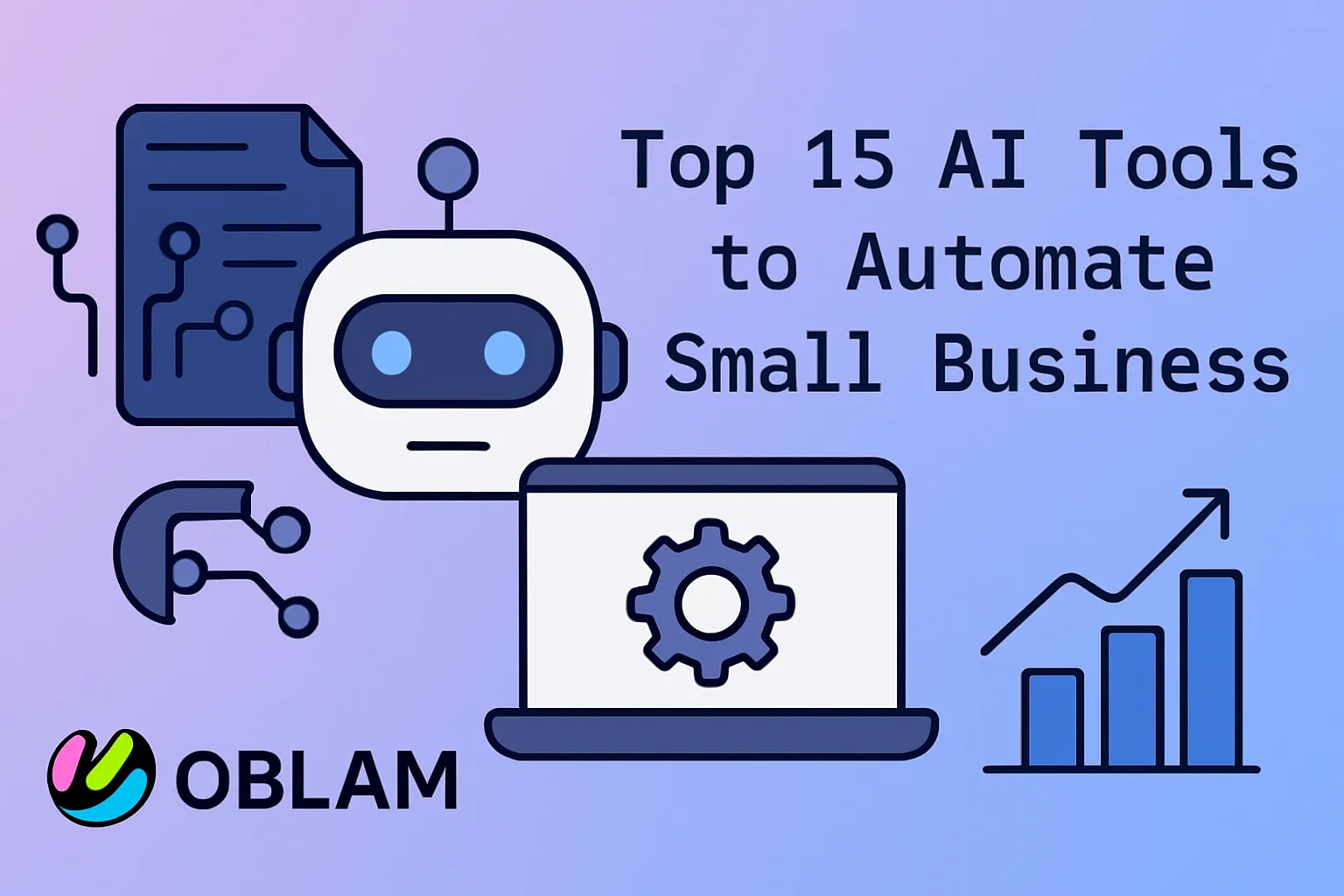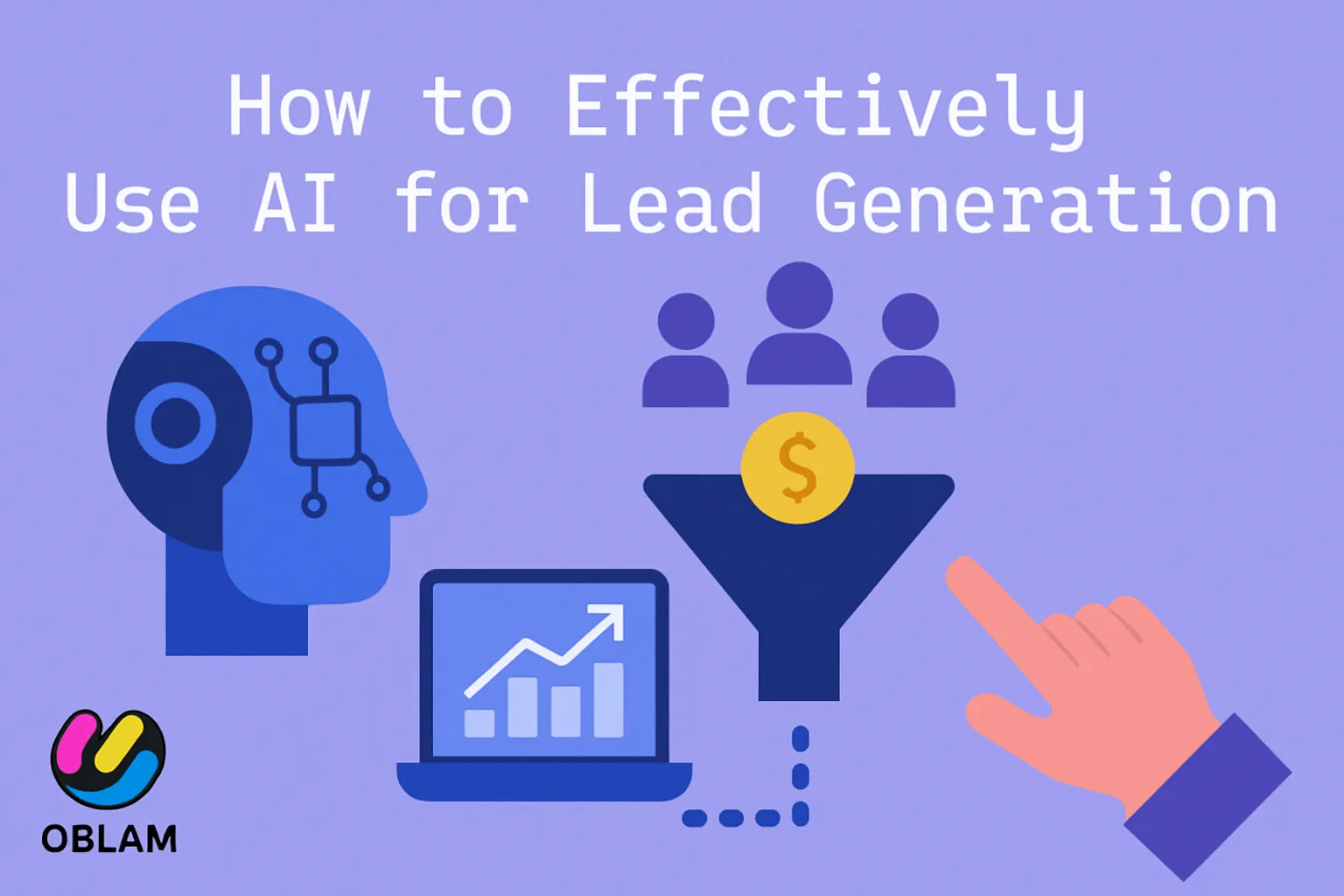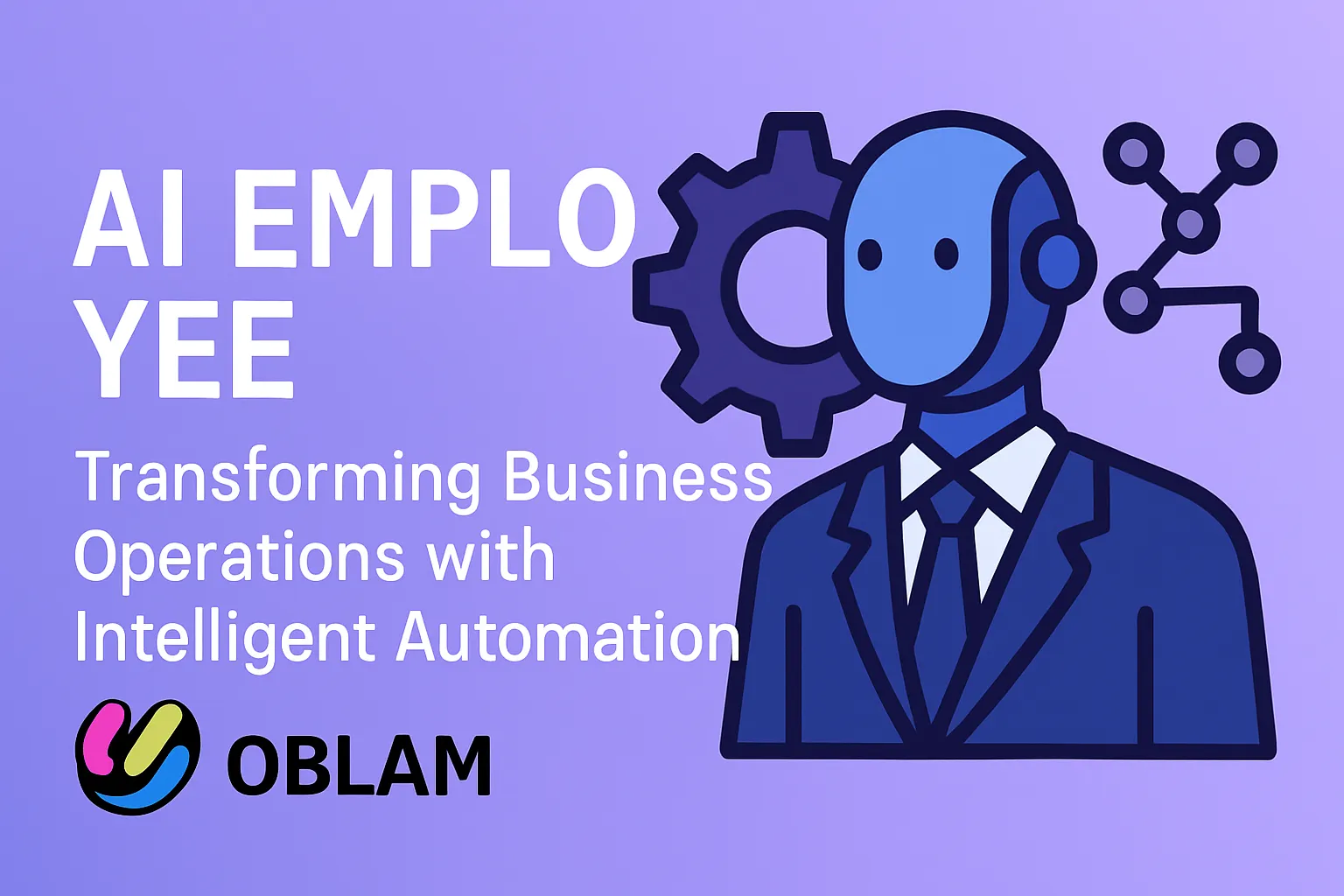- Key Takeaways
- Why AI Automation Matters
- How AI Tools Benefit Small Businesses
- Selecting the Right AI
- Top AI Tools for 2025
- Beyond the Hype: A Reality Check
- Future-Proofing with AI
- Conclusion
- Frequently Asked Questions
- What are the main benefits of using AI tools for small businesses?
- How do I choose the right AI tool for my business needs?
- Are AI tools expensive for small businesses?
- Can AI tools help with customer service?
- Is it difficult to set up AI tools for a small business?
- What risks should small businesses consider when using AI?
- How will AI tools evolve for small businesses in the future?
Key Takeaways
- AI automation is imperative for small businesses, allowing them to scale efficiency and compete on a global scale.
- By embedding AI tools into aspects such as marketing, sales, customer support, operations, and content generation, SMBs can optimize workflows and enhance decision-making.
- How to choose the right AI solution.
- Top ai tools 2025 ranging from content to customer engagement, data analysis, project management, and visual design — providing accessible solutions for businesses of all sizes.
- Human oversight is still important to make sure AI-driven processes meet ethical and operational goals, especially in sensitive domains such as data privacy.
- Ongoing learning and adjustment is required because embracing AI is frequently a learning curve that can be dealt with using training and gradual deployment.
AI tools for small business assist companies to reduce tasks, save time and identify patterns. A lot of these tools do things like manage emails, organize sales leads, and scan data for real-time updates.
Companies can use them to save money or assist groups operate superior. They span from chatbots for customer assistance to intelligent billing software.
To demonstrate how these tools operate, the core will distribute pointers and favorites for little shops.
Why AI Automation Matters

It does so by automating repetitive tasks such as data entry or sorting emails, enabling employees to concentrate more on activities that require human intervention, such as strategic planning or customer conversations. For instance, a little retailer can leverage ai business tools to triage customer inquiries or manage inventory, allowing employees to prioritize sales or explore new markets. This shift saves time and prevents teams from becoming overwhelmed by monotonous tasks on the digital assembly line.
Nearly a quarter of small businesses globally have adopted generative ai tools in some form, with most seeing improved outcomes, particularly in customer interactions or advertising. These ai tools can process vast amounts of information quickly, identify trends that humans may overlook, and even predict future outcomes with remarkable accuracy.
Take a cafe with AI, for example. It could identify which items sell best at which times and schedule promotions or inventory accordingly, reducing waste and increasing profit. AI also saves money by ensuring businesses don’t overpay or miss out on sales. It can identify when machines are about to fail so preventative maintenance can be done and work doesn’t halt.
Indeed, 50% of companies are using AI in at least two areas of their work, such as order processing and customer assistance, underscoring the significance of this technology across sectors. Customer service is another place where AI counts. Chatbots can address basic inquiries 24/7 and process orders or returns without manual assistance.
This leads to better service, quicker responses, and satisfied customers – anywhere in the world. However, many small business owners—approximately 77%—report they don’t use AI due to a lack of knowledge or uncertainty about its capabilities. Helping these owners discover the potential of innovative ai could create even more expansion and fresh opportunities to engage customers.
How AI Tools Benefit Small Businesses

AI tools, especially innovative AI solutions, provide small business owners with additional means to stay competitive with larger companies. These advanced AI capabilities assist teams by delivering smarter data and quicker outcomes, enabling them to work smarter, not harder, while automating workflows and identifying patterns that are easy to miss without technology.
Marketing
AI revolutionizes how small businesses engage with individuals by utilizing advanced AI technologies to analyze vast amounts of information. This analysis determines which ads or posts perform best, allowing for adjustments on the fly. With the integration of AI business tools, email campaigns can be triggered to deliver the right message at the moment, tailored to customer online behavior.
For instance, a generative AI tool can showcase which product images or words drive more clicks, enabling businesses to strategize their next publications effectively. AI language tools support crafting ad copy or social posts, while AI image generators can produce original visuals instantly, enhancing the creative workflow for small business owners.
In this way, a single entrepreneur can stay on top of trends and manage campaigns as effectively as a team of 20, leveraging the capabilities of innovative AI tools to automate workflows and drive engagement.
Sales
AI tools follow sales leads and identify trends in purchasing. They can anticipate what a customer is likely to want next or notify a team to intervene at the optimal time. These tools can review historical sales data and assist teams in understanding which deals deserve additional attention.
Sales chatbots can respond to simple questions, send quotes, or even close easy deals, so the sales team can leave the more challenging cases. AI can highlight patterns, such as when a particular item begins to sell in greater volume, allowing small businesses to modify inventory or marketing campaigns more rapidly.
This eliminates guesswork, guiding owners to make keener decisions.
Support
AI chatbots provide 24/7 assistance, addressing FAQs or processing orders, so customers aren’t kept waiting. This increases customer satisfaction and enables real agents to focus on large, tough problems. AI can transcribe and summarize chats or calls, helping save time for support teams.
AI tools view issues as they arise, assisting small businesses in addressing them before they escalate. This brings customers back.
Operations
AI assists with inventory monitoring, so companies are aware of when to replenish or decelerate. It can forecast when equipment may fail and initiate preventative servicing, reducing unexpected expenses. Several AI tools take on mundane tasks, like jotting down meeting notes or categorizing emails.
All of these things make small businesses save money, run smoother, and use their team’s time more effectively.
Content
Free AI writing and grammar tools, along with generative AI tools, assist teams in publishing refined blogs, emails, and web pages. Additionally, image generators can produce product photos or social graphics on the fly, allowing your staff to focus on bigger ideas.
Selecting the Right AI

Choosing the best AI tools for small business requires a candid examination of your primary needs. Every business comes upon its own unique cocktail of work, so what’s worked for one shop might not jive with another. Some generative AI tools work best for content, for example Jasper or Copy.ai, while others center on data, like Tableau or MonkeyLearn. If the objective is to assist customers, then AI chatbots such as ManyChat or Zendesk fit more. Because each tool addresses a distinct issue, it’s wise to outline your requirements in advance of your selection.
AI fills in where you might not have internal expertise or personnel. Let’s say you don’t have a data analyst or a 24/7 support team. Fill in those gaps with AI, providing guidance or solutions just when you need them. Many AI tools, such as machine learning tools, can identify patterns in your figures or respond to standard customer inquiries, which reduces drudgery.
Indeed, recent stats reveal 95% of pros report AI enables them to dedicate less time to mind-numbing tasks and 72% notice an increase in their team’s productivity. With the right AI tools, you can enhance your efficiency significantly.
AI isn’t hands off, out of the box. A few of the tools are just a bit of a learning curve; not all are intuitive. You need to consider whether the tool rewards the time invested in learning it. Things such as context-aware help, custom settings, and integration capabilities with your existing systems are a big factor.
Tools like Zapier or Make pull it all together, so you’re not going between apps all day. Customization counts as well. Some tools have static templates, while others allow you to customize elements to align with your branding or AI creative workflow.
AI can expand your online presence and optimize your site for visitors, but it’s effective only if it has the right fit with your objectives and environment. You have to see if the tool can grow with you, and if it provides you sufficient agency to make it your own.
Top AI Tools for 2025

AI tools for small businesses encompass many needs, including content generation, customer engagement, and data analysis, all while enhancing productivity. With the right AI tools, teams can work faster and smarter, and pricing options cater to any budget. Certain generative AI tools, for instance, now boast over 200 million users, showcasing their remarkable growth in the past year.
Content Creation
Small business can use AI tools for content to write posts, draft emails or make social videos. They typically have templates and can write in different tones. Well-known applications such as Jasper or Grammarly currently utilize sophisticated models to address grammar issues, recommend edits, and even generate images or brief video clips.
Others, like Canva’s Magic Write, now allow you to construct designs, captions, and video edits with just a few clicks. Pricing is flexible, with free plans for basic needs and paid upgrades for more credits or features, beginning at $10 or $20 a month.
Customer Interaction
Chatbots and AI assistants have simplified around-the-clock responses to customer queries for small businesses. A lot of tools, such as Intercom and Zendesk AI, can address common inquiries, fulfill orders as well as book hotels or food through “Operators.
Though most top-tier models manage similar tasks, many bots sound smart while some just feel more natural. Free trials abound, but enhanced features such as custom workflows typically require a paid plan.
Customer service AI can dispatch follow-up emails, categorize support tickets, and maintain chat transcripts for future reference. These tools streamline time and enable small teams to provide great service without expanding their workforce.
Data Analysis
AI tools for data analysis enable owners identify trends, spot risks, or monitor sales as they happen. Microsoft Power BI and Tableau now deploy AI to tidy data, generate charts, and forecast trends.
These platforms can aggregate data from numerous sources, allowing you to get a sense of the overall picture. Some tools now respond to voice or can answer questions like a search engine.
AI notetakers, such as Otter.ai, can record meetings and provide summaries within minutes. This allows teams to be more present during calls, with the confidence that they can reference notes afterwards.
Project Management
Project management AI applies automation to track tasks, set deadlines, and assign work based on team skills. Tools like Asana and Trello now leverage machine learning to set reminders, flag risks, or even propose ways to accelerate a project.
Most have free plans, but automation or premium reports across many might run $29 per month or more.
Visual Design
AI for design can create logos, touch up photos, or generate ad banners. DALL-E and Midjorney, for instance, allow users to type what they want to see and receive new images within seconds.
These tools just keep improving, with more styles and even better quality. Most begin free, however pro gear prices more.
Beyond the Hype: A Reality Check

Interest in AI tools for small business is at a fever pitch. A lot of trends get noticed, but the reality is more nuanced. As some think AI is going to transform the world overnight, others think we’re losing control. Decades of real-world business show there are no shortcuts: steady growth, trust, and clear strategy matter most.
Most small businesses are at the awareness or early strategy stage, with very few in true implementation or realizing actual results.
Human Oversight
Small business owners are hoping AI will fix stuff quickly. In reality, AI tools require close human watch. Data or logical fallacies can fall through, resulting in expensive blunders. For instance, a chatbot might respond to straightforward inquiries, but can’t resolve complex customer problems.
Over-reliance risks losing the human touch that creates loyal customers. AI works better as a collaborator than a substitute for human judgment. Even with helpful tools, staff must identify gaps and intervene.
Manual checks on AI-generated reports, or direct follow-up with customers after an automated email, maintain trust robust. Human review keeps AI pragmatic and outputs significant.
Data Privacy
Each jurisdiction has its own data laws like GDPR or CCPA. A lot of small businesses don’t know these rules. Even free AI tools are dangerous. Providing customer data to third-party platforms opens information to leakage or abuse.
The price for a breach is steep—forgotten confidence, penalties, and lawsuits. AI adoption poses new privacy requirements. Encrypting storage, limiting access and educating employees about secure data practices are important too.
Companies ought to select vendors with transparent privacy policies and demand their platforms provide data deletion or export options.
Learning Curve
AI tools aren’t plug and play for most teams. New users have sharp learning curves, having to learn setup, workflow changes, and how to recover from errors. Take AI for social media posts, for instance, which feels effortless but requires goals, ongoing review, and time to calibrate results.
Employee training is essential. It’s typical for teams to waste weeks or months gaining real value. Others will have to acquire new skills, such as data analytics or prompt engineering. Reward arrives only if you work and wait.
Future-Proofing with AI

AI tools are transforming small business future-proofing. Small businesses—accounting for 90 percent of global industry and almost half of the world’s GDP—are confronting a rapidly changing digital marketplace. Those who get generative AI tools rolling now are most primed to keep pace, expand, and differentiate.
AI can help cut costs, with one study finding a 37% spending drop for businesses that use AI to automate jobs. Tasks like organizing information, dispatching invoices, or responding to basic customer inquiries can be efficiently handled by an AI assistant, allowing employees more space for visionary work.
Customer service is an area where AI truly excels. Chatbots and smart help desks can reduce hold times by 40%, which makes customers happier and takes the pressure off teams. A small group can do more for more people, more quickly, without adding headcount.
For sales, AI business tools trace trends and provide insights, enabling teams to identify what resonates and customize their approach. In finance, AI can flag hazards and help maintain orderly books. These tools don’t just accelerate tasks; they empower leaders to make smarter decisions with transparent, real-time data.
Even so, AI is not a magic bullet. It works best when selected and configured with care, tailored to the business’s needs. If you’re an e-shop, AI might help you recommend items to visitors, and a small clinic could employ it to schedule appointments and maintain patient files.
Data analytics tools can reveal trends, flag issues, and assist owners in intervening before problems escalate. With AI, small businesses can do more with less, compete with bigger competitors, and have more time for needle-moving thoughts.
Conclusion
AI tools continue to disrupt small business. They slash tedious work, assist teams in making good use of time, and provide innovative means to identify patterns in data. No big budgets, no huge teams, just the right AI tool and think small. Some entrepreneurs use chatbots to interact with buyers or deploy intelligent platforms to monitor sales. The right tool can provide a significant advantage. Growth is a journey that begins with that very first step. Experiment with a tool, feel it out, then expand. Be open to change, and share what works. Want to stay ahead of the curve on new AI ideas for small business? Visit the blog for new advice and authentic tales.
Frequently Asked Questions
What are the main benefits of using AI tools for small businesses?
They handle tasks like customer support and marketing, allowing small business owners to focus on growth with innovative ai business tools.
How do I choose the right AI tool for my business needs?
Begin by establishing your business objectives. Look up generative AI tools that fit your requirements, read reviews and feature comparisons to find the right AI tools.
Are AI tools expensive for small businesses?
Many AI tools offer cheap or free plans, making them accessible for small business owners. With various pricing options based on features and usage, integrating AI tools can fit anyone’s budget.
Can AI tools help with customer service?
Certainly, AI-powered chatbots and virtual assistants, as innovative AI tools, can deal with common customer queries, provide immediate responses, and liberate employees for more complicated undertakings.
Is it difficult to set up AI tools for a small business?
Most new AI tools, including generative AI tools, have easy setup. Many provide how-to guides, tutorials, and customer support to get up and running fast.
What risks should small businesses consider when using AI?
Typical hazards include data privacy issues and potential mistakes in automation; thus, using reliable AI business tools and ensuring good data security hygiene is crucial.
How will AI tools evolve for small businesses in the future?
AI tools, especially generative AI tools, will get smarter, easier, and cheaper to use, providing improved integration and automation features that enable small businesses to remain competitive and agile in shifting markets.



